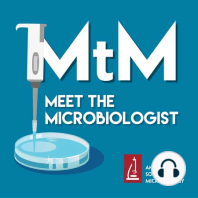19 min listen

MTS8 - Rachel Whitaker - The Evolution of Sulfolobus
MTS8 - Rachel Whitaker - The Evolution of Sulfolobus
ratings:
Length:
17 minutes
Released:
Nov 14, 2008
Format:
Podcast episode
Description
Rachel Whitaker is an assistant professor of microbiology at the University of Illinois at Urbana-Champaign, where she has developed a research program focused on the evolutionary ecology of microorganisms. Much of Dr. Whitaker’s work centers around a hyperthermophile found in geothermal springs: the archaeon Sulfolobus islandicus.
Evolution is not just history – it’s still in action today, molding humans, plants, animals and, of course, microbes, in ways we still don’t completely understand. One of Whitaker’s focus areas is archaea, a group of single-celled microbes that are found in some of the harshest environments on earth. By looking at how one variety of archaea, Sulfolobus, varies from place to place, Whitaker hopes to find whether Sulfolobus is adapting new characteristics to suit its habitats, and whether this kind of adaptation can help us explain why there are so many different kinds of microbes in the world.
In this interview, I asked Dr. Whitaker about the hot springs where she studies Sulfolobus, whether it’s hard to communicate with ecologists who work with bigger organisms, and about new discoveries she’s made related to an immune system in archaea.
Evolution is not just history – it’s still in action today, molding humans, plants, animals and, of course, microbes, in ways we still don’t completely understand. One of Whitaker’s focus areas is archaea, a group of single-celled microbes that are found in some of the harshest environments on earth. By looking at how one variety of archaea, Sulfolobus, varies from place to place, Whitaker hopes to find whether Sulfolobus is adapting new characteristics to suit its habitats, and whether this kind of adaptation can help us explain why there are so many different kinds of microbes in the world.
In this interview, I asked Dr. Whitaker about the hot springs where she studies Sulfolobus, whether it’s hard to communicate with ecologists who work with bigger organisms, and about new discoveries she’s made related to an immune system in archaea.
Released:
Nov 14, 2008
Format:
Podcast episode
Titles in the series (100)
MTS24 - Jeff Bender - MRSA in Animals: Jeff Bender is a professor of veterinary public health at the University of Minnesota, and his research interests lie in the intersection of animal health and human health, including animal-borne diseases of humans, food safety, and antibiotic resistant p by Meet the Microbiologist